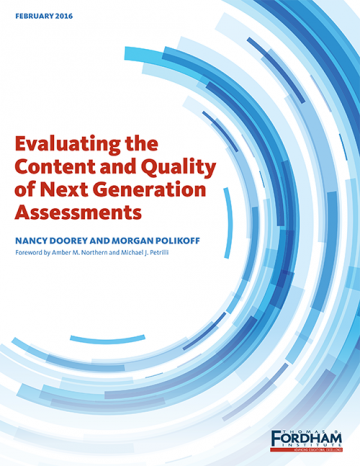Implementing the Every Student Succeeds Act toward a coherent, aligned assessment system
Jessica PoinerWay back in the days of NCLB, testing often existed in a vacuum.
Steering and rowing in the age of ESSA
If you care about state education policy and/or the new federal education law, you ought to spend some time doing three things. First, consider how the performance of schools (and networks of schools) needs to be assessed.
ESSA Accountability Design Competition: My big takeaways
On February 2, I had the privilege of being a judge for the Fordham Institute’s ESSA Accountability Design Competition. It’s widely known that I’m a fan of using competition to drive policy innovation, and this competition did not disappoint.
Designing accountability systems to avoid NCLB-era mistakes
I walked away from Fordham’s School Accountability Design Competition last Tuesday pleasantly surprised—not only at the variety of fresh thinking on accountability, but also at how few submissions actually triggered the “I think that’s illegal” response. I left encouraged at the possibilities for the future.
States: Don’t leave K–3 accountability behind under ESSA
Elliot RegensteinThe Fordham Institute’s recent accountability design competition put a lot of great ideas on the table.
Evaluating the Content and Quality of Next Generation Assessments
Evaluating the Content and Quality of Next Generation Assessments examines previously unreleased items from three multi-state tests (ACT Aspire, PARCC, and Smarter Balanced) and one best-in-class state assessment, Massachusetts’ state exam (MCAS). The product of two years of work by the Thomas B.
Top #ESSADesign proposals: Chris Hoffman et al., Teach Plus Teaching Policy Fellows, Teach Plus
Editor's note: On Tuesday, February 2, Fordham hosted the ESSA Acountability Design Competition, a first-of-its-kind conference to generate ideas for state accountability frame
Top #ESSADesign proposals: Ronald F. Ferguson, Harvard University and Tripod Education Partners, Inc.
Editor's note: On Tuesday, February 2, Fordham hosted the ESSA Acountability Design Competition, a first-of-its-kind conference to generate ideas for state accountability frame
Top #ESSADesign proposals: Richard J. Wenning, BeFoundation and SpreadMusicNow
Editor's note: On Tuesday, February 2, Fordham hosted the ESSA Acountability Design Competition, a first-of-its-kind conference to generate ideas for state accountability f
Top #ESSADesign proposals: Jennifer Vranek et al., Education First
Editor's note: On Tuesday, February 2, Fordham hosted the ESSA Acountability Design Competition, a first-of-its-kind conference to generate ideas for state accountability frame
Top #ESSADesign proposals: Morgan Polikoff, Matthew Duque, and Stephani Wrabel, University of Southern California and Baltimore County Public Schools
Editor's note: On Tuesday, February 2, Fordham hosted the ESSA Acountability Design Competition, a first-of-its-kind conference to generate ideas for state accountability frame
Top #ESSADesign proposals: Lydia Burns et al., Student Voice Team, Prichard Committee for Academic Excellence
Editor's note: On Tuesday, February 2, Fordham hosted the ESSA Acountability Design Competition, a first-of-its-kind conference to generate ideas for state accountability frame
Top #ESSADesign proposals: Josh Boots, EmpowerK12
Editor's note: On Tuesday, February 2, Fordham hosted the ESSA Acountability Design Competition, a first-of-its-kind conference to generate ideas for state accountability frame
Top #ESSADesign proposals: Dale Chu and Eric Lerum, America Succeeds
Editor's note: On Tuesday, February 2, Fordham hosted the ESSA Acountability Design Competition, a first-of-its-kind conference to generate ideas for state accountability frame
Top #ESSADesign proposals: Chad Aldeman, Bellwether Education Partners
Editor's note: On Tuesday, February 2, Fordham hosted the ESSA Acountability Design Competition, a first-of-its-kind conference to generate ideas for state accountability frame
Breaking the artificial ceilings we place over gifted and talented children
On January 23, the Economist sent a clear warning to world leaders about the ways that “governments are systematically preventing [youth] from reaching their potential.” In the article “Young, gifted and held back,” authors point to many polici







